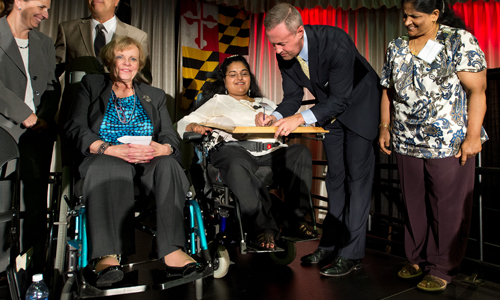The Census Bureau releases facts and figures on people with disabilities in the United States, usually in late May, for reporters to use in features on the anniversary of the Americans with Disabilities Act in July. These annual data collections provide a great starting point for developing stories and increasing coverage of money issues involving people living with disabilities.
Explore Businesses Serving People With Disabilities
Reporters seeking money stories might look at data on the businesses serving people with disabilities. You can find general patterns locally in these industries by looking through the Census Bureau’s yearly County Business Patterns. The Economic Census, which is released every five years, provides important information as well.
Obtain the NAICS Codes
To start, you’ll need industry codes from the North American Industry Classification System to quickly navigate the bureau’s American Fact Finder website. You can search keywords at the NAICS page on the bureau website, which will allow you to pinpoint certain industries catering to disabilities.
A quick search of the word “disability” brings up a number of useful NAICS codes and descriptions, including the code 623210, used for residential intellectual and developmental facilities. These facilities include group homes, hospitals etc. providing residential care services for people with intellectual and developmental disabilities.
Make sure to use a number of different keywords and phrases when you’re looking through industries, including minor variations to the same word. Using “disabilities” instead of “disability” as a keyword, for example, brings up NAICS code 624310, vocational rehabilitation services, which includes establishments that offer training and employment to people with disabilities. Searching “special needs” includes code 485991 in the results, which is the code used for special needs transportation companies.
Localize the Data
Once you have the code for an industry you’re interested in researching, you can use the advanced search tool on the American Fact Finder website to find data on a state and county level. This step helps you localize an otherwise national business story.
Looking at the 2014 table for County Business Patterns (the most recent), there are around 70 establishments in Arizona providing transportation for people with disabilities. You can also see that that number more than doubled since 2005. And the industry also employs more than 2,200 people in the state with an average salary of around $22,000 a year. Look for the same data for your area.
You can also examine the amount of revenue these establishments bring in from their services by looking at the 2012 Economic Census (the most recent). For instance, from this data I learned that special needs transportation services in Arizona made over $81 million in 2012, a steady increase from the prior two reports in 2007 and 2002.
You can also find this same data via the Industry Statistics Portal.
Realize that people with disabilities depend on a wide range of services spanning numerous industries. Try to find a number of these industries in your state and county.
Consider Other Industries Serving Individuals With Disabilities
Last year’s “Facts for Features” released by the Census Bureau commemorating the 25h anniversary of the Americans with Disabilities Act included data from the Economic Census on industries that might not immediately come to mind when thinking of similar services. Here are a few others from the release, besides special needs transportation used above, that stand out:
Pet Care (except Veterinary) Services – NAICS 812920
In 2012, there were 14,042 establishments in the United States that provided pet care outside of veterinary services and generated $3.5 billion in revenues. This industry code includes businesses that train assistance dogs.
Translation and Interpretation Services – NAICS 541930
2,338 establishments in the U.S. provided translation and interpretation services in 2012 employing more than 20,000 people and bringing in $3.9 billion in revenue. Businesses that provide sign language services live within in this industry code.
Home Health Equipment Rental – NAICS 532291
More than 3,500 businesses across the country rent home health equipment and generated $5.4 billion of revenue in 2012. These establishments provide important pieces of equipment like wheelchairs and crutches.
Follow the money to the state and county level on American Fact Finder and see what trends you find within these industries. While this information won’t tell the whole story, it can spark ideas that lead to great features, enterprise and even investigative projects in the newsroom.
Consider Other Business Story Ideas on Disabilities
Once you’ve got a handle on the numbers, start asking the questions that will guide your reporting:
- How does your county compare to others in the state?
- How does your state compare nationally?
- Do any shortages of services exist for people living with disabilities in your area?
- What new local businesses meet those needs in an innovative way?
- How are organizations serving and employing people with disabilities in your area?
You can also use Disability.gov for more information on health, housing and transportation issues that can answer questions you might have about certain industries and how they serve people living with disabilities.
Finally, when writing about disability, be sure to check out the Disability Language Style Guide produced by the National Center on Disability and Journalism, which, like businessjournalism.org, is part of the Walter Cronkite School of Journalism and Mass Communication at Arizona State University.









